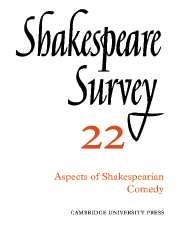Book contents
- Frontmatter
- Old and New Comedy
- An Approach to Shakespearian Comedy
- Shakespeare, Molière, and the Comedy of Ambiguity
- Comic Structure and Tonal Manipulation in Shakespeare and Some Modern Plays
- Laughing with the Audience: ‘The Two Gentlemen of Verona’ and the Popular Tradition
- Shakespearian and Jonsonian Comedy
- Two Magian Comedies: ‘The Tempest’ and ‘The Alchemist’
- ‘Thou that beget’st him that did thee beget’: Transformation in ‘Pericles’ and ‘The Winter’s Tale’
- The Words of Mercury
- Why Does it End Well? Helena, Bertram, and The Sonnets
- Some Dramatic Techniques in ‘The Winter’s Tale’
- Clemency, Will, and Just Cause in ‘Julius Caesar’
- Thomas Bull and other ‘English Instrumentalists’ in Denmark in the 1580s
- Shakespeare in the Early Sydney Theatre
- The Reason Why: The Royal Shakespeare Season 1968
- The Year's Contributions to Shakespearian Study 1 Critical Studies
- 2 Shakespeare’s Life, Times and Stage
- 3 Textual Studies
- Index
- Plate Section
Shakespeare in the Early Sydney Theatre
Published online by Cambridge University Press: 28 March 2007
- Frontmatter
- Old and New Comedy
- An Approach to Shakespearian Comedy
- Shakespeare, Molière, and the Comedy of Ambiguity
- Comic Structure and Tonal Manipulation in Shakespeare and Some Modern Plays
- Laughing with the Audience: ‘The Two Gentlemen of Verona’ and the Popular Tradition
- Shakespearian and Jonsonian Comedy
- Two Magian Comedies: ‘The Tempest’ and ‘The Alchemist’
- ‘Thou that beget’st him that did thee beget’: Transformation in ‘Pericles’ and ‘The Winter’s Tale’
- The Words of Mercury
- Why Does it End Well? Helena, Bertram, and The Sonnets
- Some Dramatic Techniques in ‘The Winter’s Tale’
- Clemency, Will, and Just Cause in ‘Julius Caesar’
- Thomas Bull and other ‘English Instrumentalists’ in Denmark in the 1580s
- Shakespeare in the Early Sydney Theatre
- The Reason Why: The Royal Shakespeare Season 1968
- The Year's Contributions to Shakespearian Study 1 Critical Studies
- 2 Shakespeare’s Life, Times and Stage
- 3 Textual Studies
- Index
- Plate Section
Summary
A great many of Australia’s first colonists were drawn from that section of eighteenth-century society described by moralists of the day as ‘undesirables who frequent play-houses’. As well as a genuine love of the drama—sometimes as onlookers, sometimes as performers of the more menial theatrical characters and tasks—they had a love for the easy pickings and the good times to be had in theatre company. But while most of them gave up, or were forced to give up their evil ways on arrival at Port Jackson, none of them lost his or her love of the theatre. They had been brought up with it; it was almost the sole and certainly the most popular form of public amusement available to them.
In all the theatres left behind them by these men and women the fare had been basically the same. There was always the solid core of old favourites, including the many rewritten or otherwise arranged versions of Shakespeare's Richard III, Hamlet, Othello, Macbeth, and Romeo and Juliet, and the comedies such as the Garrick version of The Taming of the Shrew. No wonder that in their idle moments—and there were to be plenty of these, as well as hungry ones—the thoughts of Australia's unwilling first colonists should turn to the theatre.
- Type
- Chapter
- Information
- Shakespeare Survey , pp. 125 - 134Publisher: Cambridge University PressPrint publication year: 1970

